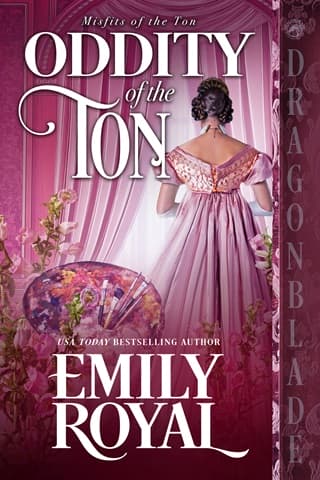Chapter Sixteen
After returning Miss Howard home, Monty stopped off at White's for luncheon—all that talk of steak had whetted his appetite, and the cook at White's, unlike the poisoner employed by Lady Fairchild, could, at least, cook a passable steak, by virtue of knowing the difference between medium rare and charred to within an inch of its life. Then, having waved off his barouche after he'd arrived at White's, he set off on foot to his townhouse.
As he neared his home, he spotted a carriage waiting at the front of his house.
Who the devil might that be? Neither he nor Mother were expecting visitors.
Had Sir Leonard come to discuss the finer points of the marriage settlement? Or perhaps he'd discovered Monty's ruse and had come to confront him over using his eldest daughter for his own nefarious purpose.
Which would be a pity, because despite Sir Leonard's low birth, Monty had found himself admiring the man.
There was considerably more to Sir Leonard than the persona he displayed in public. He was a combination of the two most formidable specimens of his sex: the businessman who made his fortune through hard work, insight, and a sharp eye for detail; and the father, stern and resolute in his determination to ensure the happiness of a most beloved daughter.
Sir Leonard put the rest of his sex to shame.
Including Monty himself.
He approached the carriage, then recognized the Whitcombe crest on the side. The carriage was his.
A liveried footman appeared, carrying a trunk, which he secured on the back of the carriage, then the driver strode into view.
"Thompson?" Monty called out. "What is all this? Surely you're not having to go out again? The horses will be tired, and—"
"There you are, at last!" a sharp voice cried.
Monty's mother stood at the top of the front steps, holding a valise, flanked by her maid and a footman.
"Mother? Are you going somewhere?"
"I'd have thought that was obvious, Montague," she huffed. "I'm returning to Rosecombe."
"We're not to go for weeks yet."
"We are not going. I'm going."
"Why?"
"Must I justify myself to you?" She held up her valise and gestured to her maid. "Well? What are you waiting for, Dora?"
"Pardon me, ma'am." The maid took the valise, bobbed a curtsey, then descended the steps, where the waiting footman helped her onto the back of the carriage. Monty's mother glided toward the carriage, then gave the footman a pointed look. The servant colored, then bowed and opened the carriage door.
"Is something the matter, Mother?" Monty asked.
"Don't be insolent. You know perfectly well there is."
"I accept it was remiss of me not to introduce Miss Howard to you before offering her my hand."
"No, Montague, it was remiss of you to offer for her at all," she replied. "I cannot believe you'd make such a spectacle of yourself—at the Westburys' party, of all places!"
"Is it the manner of my proposal that offends you, Mother, or my choice?"
"Both. But while I can forgive your unseemly behavior, I cannot understand why you'd cleave to a young woman rumored to be soft in the head."
Soft in the head—how dare she?
"Rumors!" Monty scoffed. "Since when must we be dictated by gossip?"
"Rumors are not without foundation, Montague. I ignored gossip to my cost once before—then I discovered the fruits of your father's infidelity. I shan't make the same mistake again."
"You can hardly compare Miss Howard to my sis—"
"Speak no more!" Mother cried. "Must you distress your poor mother so? That creature is not your sister! As for Miss Howard—Lady Fairchild has much to say about the girl's eccentricities. And Lady Francis called on me this morning to convey her sympathies."
Monty let out a snort. "Lady Francis is an empty-headed fool, with nothing but gowns and jewels on her mind."
"I will not be pitied!" she said. "If you must marry the girl, then so be it. But I shan't remain here to be ridiculed because of it." She reached into her reticule and drew out a handkerchief, dabbing it against her eyes. "Unless, of course," she added, "there's anything you might wish to say—or do—to ease your poor mother's heart."
He caught a glimmer of cunning in her expression before she dabbed her eyes again. Then she lowered her handkerchief—which, no doubt, was as dry now as it had been before—and looked at him expectantly.
Her show of fleeing to Rosecombe was a ruse. Perhaps she thought herself a gamester, attempting to persuade her opponent that she had the better hand.
Then he would do what any self-respecting player would—call her bluff.
He placed his hands on her shoulders and kissed her on the cheek. "Very well, Mother dearest," he said. "I shall bid you a safe journey."
Her eyes widened. "If you're resolved in this…"
"I am," he said.
"Then I wish you joy," she said, her tone conveying anything but. Then she nodded, and the footman helped her into the carriage.
Monty rapped the side of the carriage. "Drive on!"
The carriage set off, and he watched it roll away, the horses' hooves clip-clopping on the road. Then it turned a corner at the end of the street and disappeared.
 Fullepub
Fullepub 



